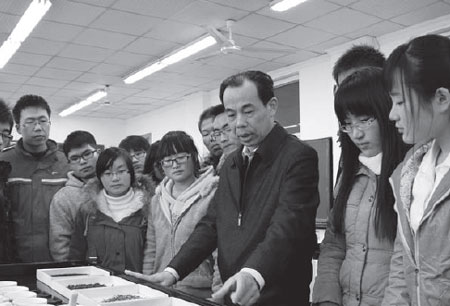
Xia Tao gives a class to students majoring in tea science at Anhui Agricultural University. Provided to China Daily
Xia Tao, a 51-year-old professor of tea science at Anhui Agricultural University, has been taking four tea breaks every day for decades.
"Tea drinking used to affect my sleep when I was young," he says, laughing. He has a booming voice with a hint of an Anhui accent. "But after decades of drinking tea daily, it does not have such an effect on me any longer."
Xia graduated with a major in tea science in 1983. He is now one of the leading authorities in China's tea science field, especially in tea processing.
Yet upon college graduation, tea was something he wanted to get away from.
"I was very interested in fixing things, like wireless equipment when I was a kid, and I was planning to study agricultural tractors as my major," he says.
Born and raised in Chuzhou, a small city in east Anhui famous for high-quality tea, Xia says he was encouraged to become involved in tea by his father, a tea fanatic who worked in a post office in Chuzhou.
"My father made good acquaintance with Chen Chuan, one of the leading tea professors in Anhui, and believed that tea science was worth studying," he says.
At the time, Chen was teaching at a branch school of Anhui Agriculture University in Chuzhou.
Following his fathers' advice, Xia reluctantly took tea science as his major under the guidance of Chen.
"Throughout my college years, I worked hard on other subjects, such as math and English, hoping I could get good grades and switch to another major when I applied for graduate study."
After failing the graduate application in 1983, Xia stayed at his alma mater and worked as a lecturer, teaching courses on tea production.
It was during that time he really started to understand the beauty of tea.
"We mainly studied basic, scientific knowledge about tea leaves during the first four years in college. I was not excited about it because I did not think there was much I could achieve in simply studying leaves," Xia says. "It was only when working and studying with Chen, doing fieldwork and inspecting local tea factories in many provinces that I realized there is so much we can do as tea experts."
He says many tea farmers had limited knowledge about tea growing and little market access. These happened to be the areas that Xia found he could contribute to.
Xia's main research focus in recent years has been in tea manufacturing, especially on tea processing and its flavor chemistry. Xia says Japan has much to teach China in this area. He visited the country in 2009 and was impressed by what he saw.
"Tea processing is very impressive in Japan, because tea is almost blended into your life, produced as a dessert and in daily products, such as soap and facial masks. All of these processes are very much standardized," Xia says.
Xia's research takes him to many conferences and lectures, but he says fieldwork for students is also of crucial importance.
"During our years in college we got to visit enchanting, beautiful places for our field - work, because tea leaves grow on beautiful mountains and along clear waters," Xia recalls.
But today his students are not so lucky.
Professor says the study of leaves is now just his cup of tea
"The industry is becoming increasingly market-oriented. Most tea companies do not show much interest in accepting college interns as they are busy making profit," Xia says. "The places our students can go for internships are very limited."
Today, tea science is the most popular major at the university, and finding a job is no longer a problem. Xia says the change is largely because of the emergence of branded, high-quality tea.
Xia's wife, Gao Liping, also enjoys drinking tea, but his daughter, who's in her mid-20s, prefers coffee.
"Many of our students also prefer coffee and ice cream," Xia says, laughing. "Do not worry about that. Tea is something that you need to take time to understand its value. It took me at least five years before I really indulged in it. They will learn to appreciate tea when they are in a later stage of life. It's predestined if tea will become part of your life or not."
Contact the writers through zhangyue@chinadaily.com.cn
Ma Chenguang contributed to this story.
We recommend:
